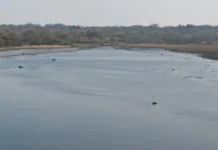Since starting my Family Tree back in 2008, I have found that some ancestors catch your attention and interest more than others, for some unknown reason. One such ancestor in my tree is my Great x2 Grandfather, Edward Millward.
I first came across Edward Millward when I was researching Eliza Clara Millward, my great grandmother on my maternal grandfather’s side of the family. It was during the first few months of starting to seriously research my Family Tree, back in 2008.
I had been overwhelmed with the amount of information I had come across during my initial searches; these “searches” mostly consisted of typing my grandparents’ details, and great grandparents, if I knew them, into a search engine and seeing what came up! After a few weeks of doing this and searching for any information about them on Ancestry.co.uk, I started to get more organised and decided to concentrate on researching one grandparent at a time, instead of all of them at once!
A couple of months later, I started looking into my maternal grandfather’s side of the family. One of my aunts had my grandfather’s birth certificate and let me borrow it to help my search. My grandfather was born in Buckinghamshire, in England. It gave his mother’s name as Elizabeth and her maiden name as Millward, which sounded like a potentially easy surname to look up. I soon found out differently! Millward is quite a common name in the West Midlands and the south of England, both of which are quite near to Buckinghamshire, my grandfather’s birthplace.
Another problem was that my mother, on seeing her father’s birth certificate, remarked that there must have been a mistake, as her grandmother’s name had been Clara Eliza, not Elizabeth. Fortunately, my aunt knew the story behind the name change; my great grandmother disliked the names Clara Eliza and had informally changed it to Elizabeth at times and one time coincided with my grandfather’s birth. She reverted back to her original names sometime after my grandfather’s birth. Her name is correctly given as Clara Eliza on the various Census Records, marriage certificate etc., but she is forever recorded as Elizabeth on my grandfather’s birth certificate.
On searching for Clara Eliza’s family, I found out that her parents were Edward Millward and Clara Povey. A copy of their marriage certificate was sent to me by my mother’s first cousin, Diane, who was also looking into that side of the family. The marriage certificate confirmed the information that I had discovered on the internet and also gave me another generation, Edward and Clara’s fathers, William Milward and Charles Povey.
Edward was born in Stourport, Worcestershire in 1843. By the time of the 1851 Census, the first one after Edward’s birth, Edward’s mother, Elizabeth, was a widow with five children aged between five months and eleven years old. Edward, aged seven in 1851, was the middle child and the only son. By going back ten years to the 1841 Census, I confirmed that William was Elizabeth’s husband and the father of her two eldest children, Sarah and Jane Millward, aged two years and eight months respectively in the 1841 Census.
William died in West Bromwich in 1850. Sometime between the 1841 Census, when the family lived in Kidderminster, Worcestershire, and the 1851 Census, quite a few changes occurred in the family’s life; three children were born during that period, Edward in 1843, Ellen in 1844 and Elizabeth in 1850; the family moved to another county; at the time of the 1841 Census, they were living in Worcestershire; by the time of the 1851 Census, their residence was in West Bromwich, Staffordshire. Elizabeth, William and Elizabeth’s youngest child, was born in West Bromwich in 1850, so we know that they moved there between 1841 and 1850. The biggest change in the family’s life also happened in 1850, when William died in West Bromwich.
On the 1841 Census, William’s occupation is given as “foundry man”; there was no occupation listed for Elizabeth. By the time of the 1851 Census, Elizabeth is widowed and the sole bread winner. Her occupation is given as “shopkeeper”.
Edward has fascinated me for a few years. Whilst researching their branch of my family tree, I suddenly noticed on the 1891 Census that, alongside Edward’s name, in the last column, headed “Deaf/Dumb, Blind, Lunatic, Imbecile”, the word “Blind” had been written in the space. I immediately checked the previous Census records and the same thing had been recorded for Edward on the 1871 and 1881 Census records. How had I not noticed this before? I had found these records almost a year earlier. I had looked at them about a dozen times and yet I had never checked that last column.
In the 1861 Census, Edward was about 18 years old and his occupation was given as “caster”, which was a person who made small glass bottles for sprinkling salt, pepper, sugar etc. In the 1871 Census, no occupation is noted for Edward, just two letters, N K. I take these letters to mean that his occupation is “not known”. This is the first Census to show that Edward was blind, so perhaps he was unable to work. At the time of the 1871 Census, Edward was married with three young children aged between five years old and three months. He married my great, great grandmother Clara Povey in West Bromwich in 1864.
When I looked at the 1871 Census for Edward, Clara and their children, I wondered how they survived in that day and age without an income. There is no occupation listed for Clara. They did have a lodger living with them, a man named Charles L Lloyd, aged 22, a blacksmith, originally from Hereford. There seems to be no family connection between them and Charles. Also living with them at the time was Clara’s mother, Harriet Povey, my great x3 grandmother. Harriet was aged 62 at the time of the 1871 Census and I noticed that she had an occupation, a laundress. It seems as though these two are the family’s only sources of income and helped them to survive financially.
I have no idea what caused Edward’s blindness, if it was caused by an accident or as a result of some medical condition. The 1911 Census gives a little more information: under the column now titled “Infirmity”, the words “totally blind since 1868” have been written. Does this mean he was partially-sighted before then and his condition worsened in 1868, or does it simply mean something happened in 1868, either accidental or medical, and he became totally blind as a result of this? Unfortunately, I cannot see a way to find out these details. There is no mention in Census records before 1871 that Edward had any medical conditions.
My interest in Edward’s condition is increased by the fact that my grandfather, Edward’s grandson, became partially sighted and then blind in the last ten years or so of his life. Unlike Edward, who was in his mid-twenties when he became totally blind, my grandfather’s sight problems didn’t start until he was in his seventies, but I still wonder if there is a connection, especially if Edward’s condition was caused medically and not accidently.
In the 1881 Census, Edward is still listed as blind but his occupation is not totally legible; the first word is clearly “coal” but the second word is harder to read. It seems to say “miner” but would it be possible for a blind man in the 1880’s to be a coal miner? When the original record was transcribed, it was transcribed as “coal miner “but it is difficult to know for sure.
However, in the 1891 Census his occupation is plain to see. He is now shown as being a “coal dealer”, and this occupation continues to be recorded for Edward in the 1901 and 1911 Censuses. It seems to have become a family business, as in the 1911 Census, Clara’s occupation is given as “assisting in business” and their son Alfred’s occupation is “carter in business”. A carter was a “carrier of goods by wagon”. Edward is noted as the owner/employer of the business in all three censuses.
By the time of the 1881 Census, Edward and Clara had six children between the ages of 15 years and 3 weeks old. They had one other daughter who died in 1874 aged about 4 years old and two sons were born in 1887 and 1893. Of the six living children they had by 1881, five were living at home with them. Their eldest child, a son called Charles, is missing from the family’s 1881 Census; this could mean that he had moved out of the family home, was away for the night the census was taken, or that he had died.
On the 1911 Census, it states that during the marriage of Edward and Clara, eleven children were born alive, but that only eight were still alive by 1911. Until the 1911 Census was released, I was aware of only nine children born; obviously, there were two other births between the times the Censuses were taken. The only child that I know of who died was their 4 year old daughter who died in 1874.
About two years ago, Ancestry.co.uk added trade directories for some parts of the country to their records collections. Edward is listed in the UK, Midlands and Various UK Trade Directories 1770 – 1941. He is listed under Kelly’s Directory of Staffordshire for the years 1896 and 1900 as a coal dealer. The business address is the same as his home address, 7 Frederick Street.
There is also a listing for an Edward Millward, Coal Agent, in the 1880 Trade Directory. The business address this time is Spon Lane. I cannot say for sure if it is the same Edward Millward as I am unable to verify the address with the census records as I was able to do with the other two dates, as the home address and business address were different. The date is the year before the 1881 Census record in which the occupation was partially illegible, only the first word “coal” being clearly written. It doesn’t matter how long I stare at the Census record, the second word still looks more like “miner” than “agent” or “dealer”!
Edward lived until the age of 74, dying early in 1917, in West Bromwich. His wife, Clara, also died in 1917, aged 70, just a few weeks after Edward’s death.
Help keep news FREE for our readers
Supporting your local community newspaper/online news outlet is crucial now more than ever. If you believe in independent journalism, then consider making a valuable contribution by making a one-time or monthly donation. We operate in rural areas where providing unbiased news can be challenging. Read More About Supporting The West Wales Chronicle






















